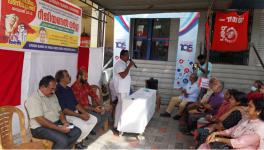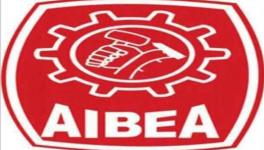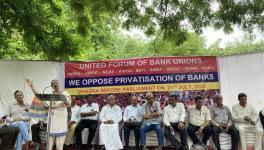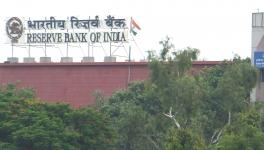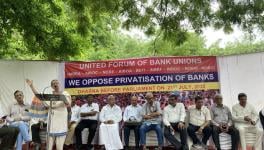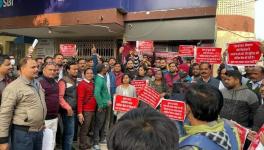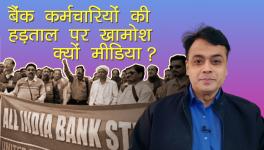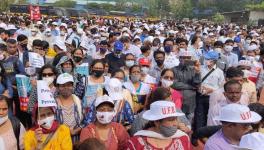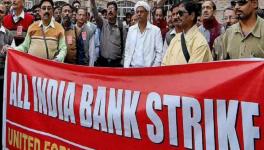Bank Employees Begin Two-Day Strike for Higher Wages
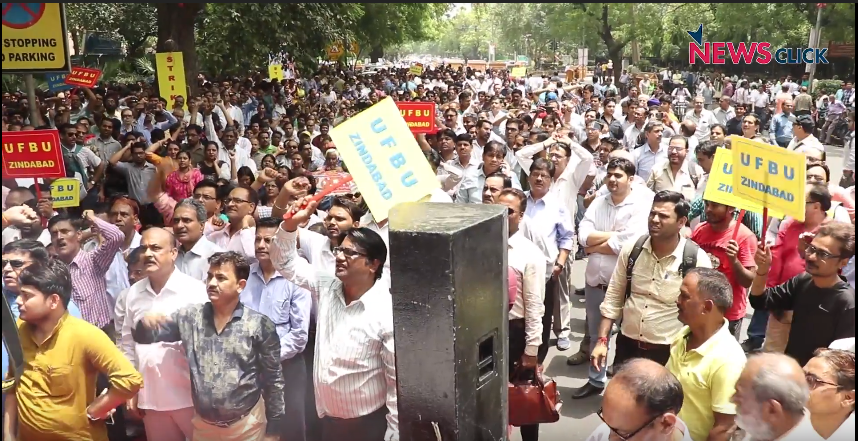
Bank employees across India began a two-day strike on 30 May in protest against the measly 2 per cent hike in wages that have been stagnant for almost 6 years by the Indian Banks’ Association (IBA), the governing body of banking management in India.
All employees of public-sector banks as well as the majority of private-sector banks are participating in the nationwide strike, which was called for by the United Forum of Bank Unions (UFBU), an umbrella platform of nine major employees’ unions and officers’ associations. On the first day of the strike, services were hit in more than 85,000 bank branches across the country. Between 85-90% of employees in the banking sector participated in the strike, said CH Venkatachalam, general secretary of the All India Bank Employees’ Association (AIBEA), speaking to Newsclick.
Wage revision for bank employees in India has been due from 1 November 2017, after the last wage settlement took place in 2012.
On 5 May 2018, a meeting was held after much delay between the IBA and the UFBU to negotiate the wage revision, but the IBA offered an increase of a mere 2 per cent over the total wage bill of banks as on 31 March 2017.
This initial offer was rejected by the UFBU. On 8 and 9 May, bank unions held protest demonstrations in different parts of the country.
During the last (10th) Bipartite Wage Settlement that was made effective from 1 November 2012, the IBA had agreed to a hike of 15 per cent increase over the total wage bill.
The reason stated by the IBA for the paltry ‘offer’ was that banks are not doing well and that the profits have come down, therefore banks cannot afford to increase the wage bill too much.
However, as Venkatachalam points out, the operating profits of banks have been rising, while the net profits have come down only because of the bad loans.
In fact, for the past four years, public-sector banks have been making rising operational profits, but it is due to the provisions and concessions for bad loans — around 80% of which are corporate loans — that the banks had been making net losses.
For example, as of 31 March 2017, public banks registered an operating profit of around Rs 1.59 lakh crores, while the provisions for bad loans were more than Rs 1.70 lakh crore, so the net loss was more than Rs 11 thousand crore.
Moreover, Venkatachalam pointed out that the ratio of wage expenses to the total expenses of the public banks had been decreasing.
“In 2012, the wage bill accounted for 14% of the total expenses of public-sector banks. But in 2017, the wage bill constituted only 11% of the total expenses of the banks,” said Venkatachalam. He said the wage bill was decreasing because the banks were not recruiting enough people, were outsourcing even some permanent jobs, etc.
“This contention of the IBA that the banks do not have enough money was the further provocation,” he said.
Further, he said it was wrong to link wages to net profits, and absolutely unacceptable to link employees’ salary expenses to bad loans.
“The gross profits are what are earned by the banks, that money has come to them through the work done by the employees. The workers are only asking for a share of what they have helped produce. Net profits account for bad loans, and other contingencies, which have nothing to do with the work done by the employees,” said Venkatachalam.
“The banks must recover the bad loans from the corporates, not adjust it in the wages they pay the employees. Do not put the burden of bad loans on employees and the general public, which is also happening by way of increase in charges, etc. The employees must not be punished for the fault of the corporates.”
Venkatachalam said the government had been advising the banks and the IBA to expedite the wage revision settlement and conclude it before 1 November 2017.
Representatives of UFBU had met the Finance Minister in November 2017, and it was only after six months that the IBA resumed the wage revision negotiations in May 2018.
So the hike in salaries would have been due for almost a year before the issue gets sorted out. There are around 8.5 lakh employees in public-sector banks and another 1 lakh employees in private and foreign banks. While the wage revision is decided on the basis of the performance of the public-sector banks, the revision applies to all bank employees, even those of the private sector.
The UFBU consists of the AIBEA, the All India Bank Officers’ Confederation (AIBOC), the National Confederation of Bank Employees (NCBE), the All India Bank Officers Association (AIBOA), the Bank Employees Federation of India (BEFI), the Indian National Bank Employees’ Federation (INBEF), the Indian National Bank Officers Congress (INBOC), the National Organisation of Bank Workers (NOBW) and the National Organisation of Bank Officers (NOBO).
Get the latest reports & analysis with people's perspective on Protests, movements & deep analytical videos, discussions of the current affairs in your Telegram app. Subscribe to NewsClick's Telegram channel & get Real-Time updates on stories, as they get published on our website.









